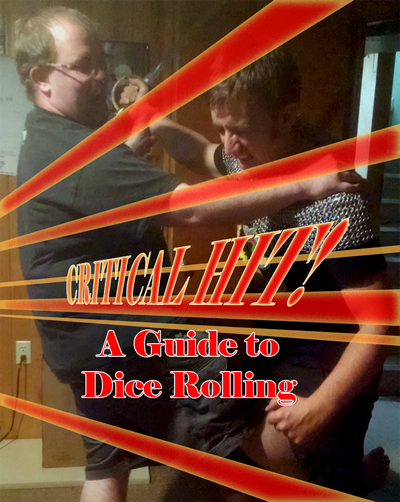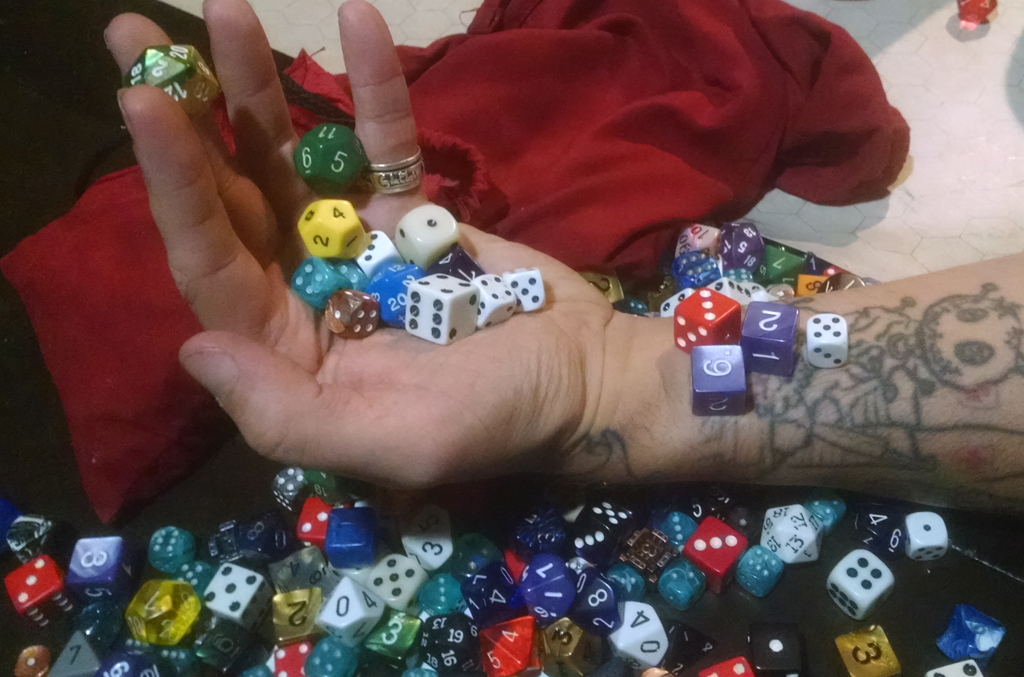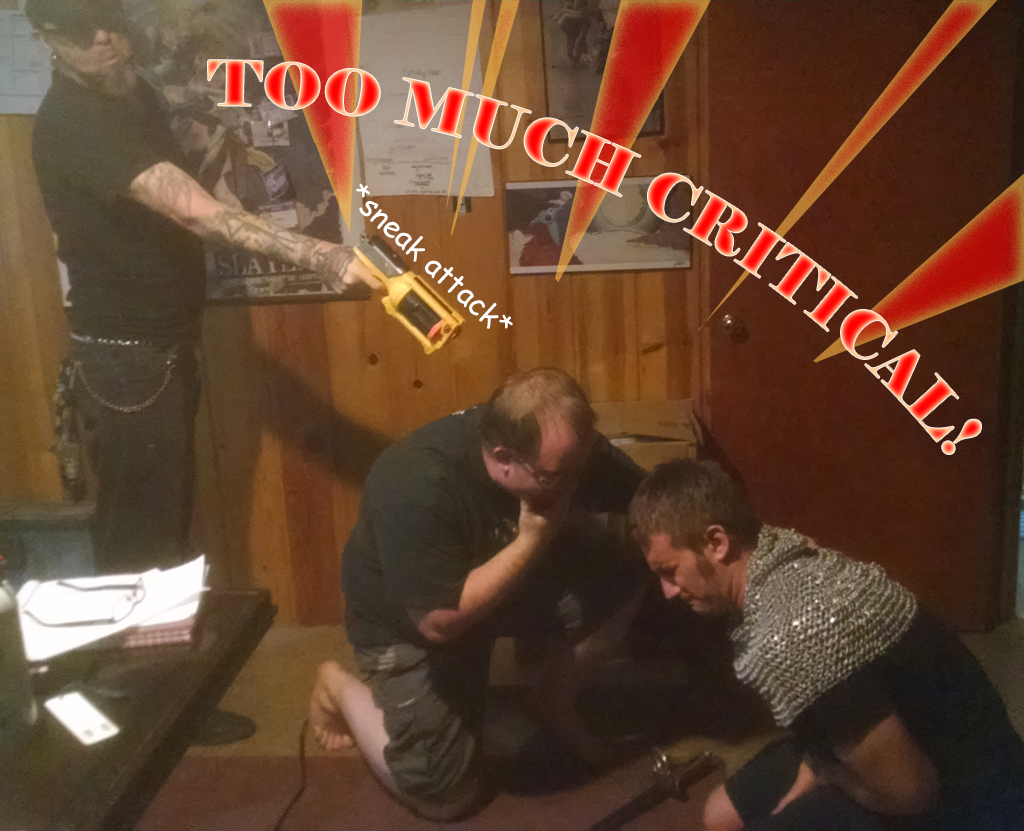Critical Hit! A Guide to DICE

I talk a lot about rolling dice in my blog posts. I say things like, rolling well, rolling poorly, getting close etc… When someone rolls a die the world in the game is affected. Sometimes it’s big, like hitting and killing an evil overlord. Sometimes it’s small, like convincing a farmer to reduce the price of grain. Regardless, a roll of the dice is important, even if someone’s life is not in danger.
Before we can discuss the specifics on the rolls, you must first understand the why. Why does gaming use dice in the first place? For many reasons, but most importantly because it adds randomness to the world. It’s an easy way to describe and quantify chaos. Typically dice are used when two or more forces are opposed to each other, such as in combat. Since both sides want to win, you need a neutral party to referee the outcome. In many cases that neutral party is the randomness of dice rolling.
Another reason to use dice is to give a feeling of tension to the game. You have one chance to grab and save your friend falling past a window, can you do it? To build tension gather everyone’s attention on the roll, quiet them down, describe the situation determine what you need to roll.
As the dice begin rolling the DM utters, “You shoot your arm out grasping for purchase…” When the dice rolls to a stop and you see the result.
Just enough!
“Grabbing your friend’s arm you swing them back towards the building. Bracing yourself against the window you begin pulling them up to safety.”
While it doesn’t always play out that way, it gives players a chance to try what they want. Roleplaying’s greatest advantage is openness to creativity. The world and the actions you perform aren’t locked to some preset list of actions and reactions, like video games. Dice are a way to give order to this infinite chaos, like I describe previously dice are the neutral party in the world.
When a player or DM rolls dice it should have some sort of impact on the world. It’s up the DM to describe this because they are the one who knows what the player needs to roll. As a player, the most frustrating thing is when I roll the dice and the DM simply makes a note and moves on. It happens a lot in combat with new DMs. I roll to hit, he/she says “you hit,” then I roll damage, and he/she says “okay, next?”
My usual response to this is, “Did I hurt it? Is it just ignoring me? What’s going on?”

Without any feedback the dice rolling is just that. I like combat in tabletop, but it’s not because I like rolling dice and seeing high numbers. I like combat because it’s intense. Thinking of the epic battle raging on the table is fun and exciting. Yet if there’s no feedback, all of the fun disappears and it becomes just rolling dice. The story and scene aren’t fleshed out and it’s less fun.
The best solution is to ask the DM to describe what happened. Or stand up and start acting it out yourself to help inspire the DM. Every DM will do this from time to time, and sometimes a helpful reminder is nice.
With this in mind we can look at the different results from the rolls. For the most part though, when playing, you will encounter the middle-of-the-road rolls. These are either a solid hit or miss but neither of the extremes. There’s the narrow hit or miss, where players roll just enough to pass or fail. And last but not least, at the far ends of rolling are the critical successes and failures.
For a standard hit, I generally describe that the player passed at whatever task it was that he was doing. Landing a solid blow in combat or being able to convince the person to help them out. The same for failures, the sword came up short or the person is simply too busy to help.
With close fails, I explain that their action had been blocked by something else. For example, the target had heavier armor that deflected the blow or the person was called away. If they succeed, I adjust this slightly, such as saying the armor is thick but with more force you managed to cut through or having the person agree to the request as they’re walking away.

Celebrate the Critical!
If someone rolls a critical success they did awesome! Add some flair to the action, give the player a little extra. Perhaps they succeeded at the impossible. Have them act it out or ask what kind of extra bit would be appropriate.
“I successfully countered the evil Dragon-Mayor’s fly spell, when he was hundreds of feet above the ground. He hit pretty hard.” - Jacob, Shadowrun
Alternatively, they could have failed what should have been a simple task. This is often very funny, depending upon the task at hand you could also give them a bit extra failure. Such as letting go of their weapon or tripping. Generally, a critical failure puts them worse off than if they did not try at all. Though you, the DM, would have to be the judge of how much.
I hope you’ve enjoyed this rant on dice rolling and I hope it helps your games! If you have an awesome store of good/bad dice rolling please leave it a comment below or on my facebook page ! See you for the next post. In the meantime, have fun adventuring!
Criticals throughout the ages
“My intellectually challenged Goliath Warrior critically succeeded a knowledge check on Kobolds. Making him the group’s resident Kobold expert and showing that he does not some things.” - Andy, D&D
“Stopped a helicopter pilot with a Gastly’s Mean Look in Pokemon Tabletop.” - Mike, Pokemon Tabletop
“The groups acrobatic elf was leaping out a nearby window. Critically failing both the initial roll and the reroll. Sending him bouncing off the window frame and crashing back onto a chair destroying it.” - Steven, D&D
* This story was originally published as a post from the blog "The Tech Deck." Read all stories from this blog